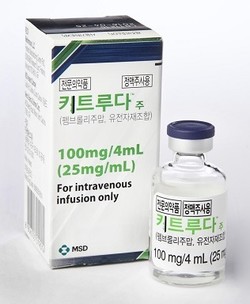MSD’s anti-PD-1 immunotherapy Keytruda (ingredient: pembrolizumab) won local approval for breast cancer indication.
On Friday, the Ministry of Food and Drug Safety granted the use of Keytruda in combination with chemotherapy to treat patients with locally recurrent unresectable or metastatic triple-negative breast cancer (TNBC).
Keytruda can be used in combination with three chemotherapy regimens -- albumin-binding paclitaxel, paclitaxel, and gemcitabine+carboplatin.

The latest nod gave Keytruda the first indication for breast cancer.
In total, Keytruda has 18 indications for 14 types of cancer in Korea.
TNBC is breast cancer in which the expression of estrogen receptor, progesterone receptor, and HER2 receptor are all negative. It accounts for 15-20 percent of all breast cancer in Korea.
The risk of TNBC is high in premenopausal or young people, and TNBC results in a relatively poor prognosis because it has a higher chance of metastasis and recurrence than that of other types of breast cancer.
Keytruda proved improved progression-free survival (PFS) and duration of response (DOR) compared to chemotherapy alone in a phase-3 study KEYNOTE-355.
The median PFS of the Keytruda plus chemotherapy combination was 9.7 months, significantly longer than 5.6 months in the control chemotherapy group. Thus, regardless of the type of chemotherapy regimen, the addition of Keytruda meaningfully improved PFS over chemotherapy alone.
The DOR in the Keytruda plus chemo group was 19.3 months, versus 7.3 months in the control arm, showing a longer effect in patients who responded to the treatment.
In the sub-group analysis, the median PFS of Asian patients treated with Keytruda plus chemotherapy was 17.3 months, three times longer than 5.6 months of the control group. The study results were published in the Lancet.
The National Comprehensive Cancer Network (NCCN) of the U.S. recommends Keytruda plus chemotherapy as the first-line therapy for PD-L1 positive (CPS≥10) TNBC.
Also, the MFDS approved PD-L1 IHC 22C3 PharmDx Kit, an in vitro diagnostic device that can measure PD-L1 expression, is required for the prescription of Keytruda.

